最新高考英语动词时态语态复习课件
文档属性
| 名称 | 最新高考英语动词时态语态复习课件 |

|
|
| 格式 | zip | ||
| 文件大小 | 1.5MB | ||
| 资源类型 | 教案 | ||
| 版本资源 | 人教版(新课程标准) | ||
| 科目 | 英语 | ||
| 更新时间 | 2017-11-15 00:00:00 | ||
图片预览

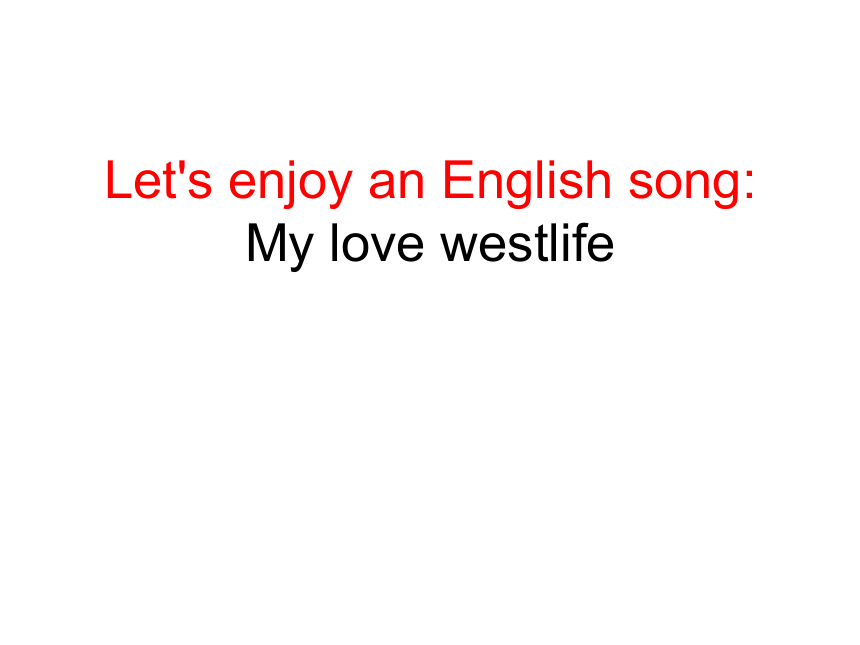
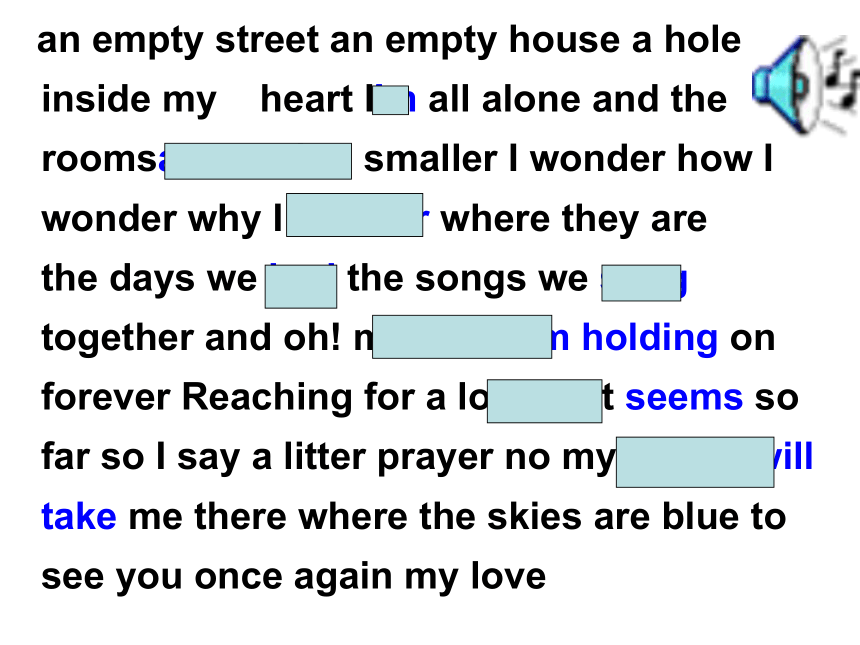
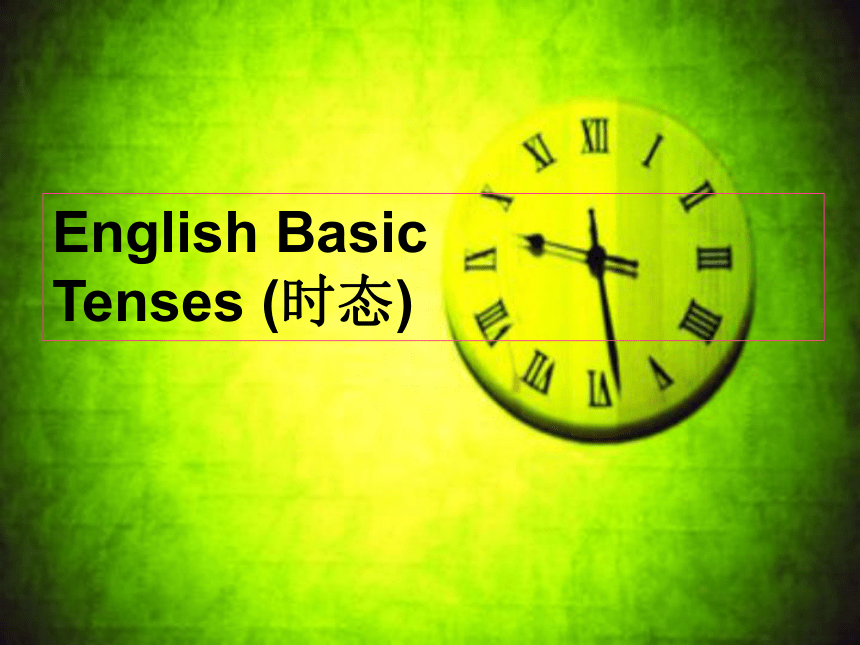
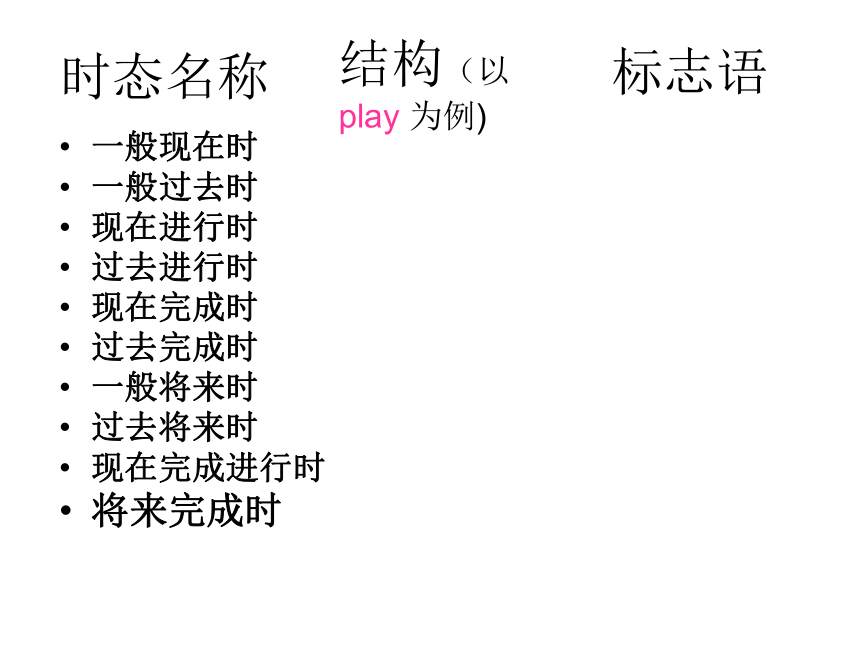
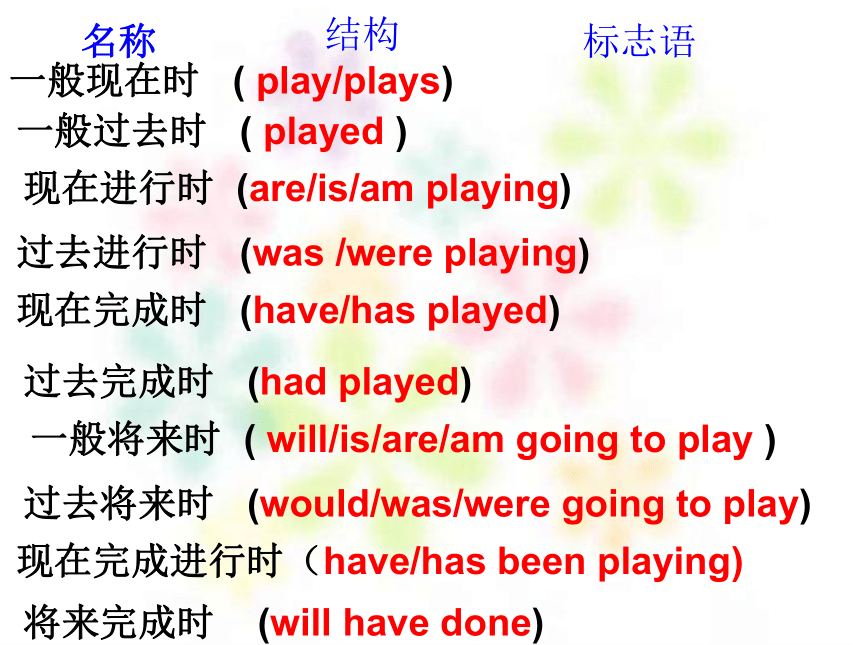
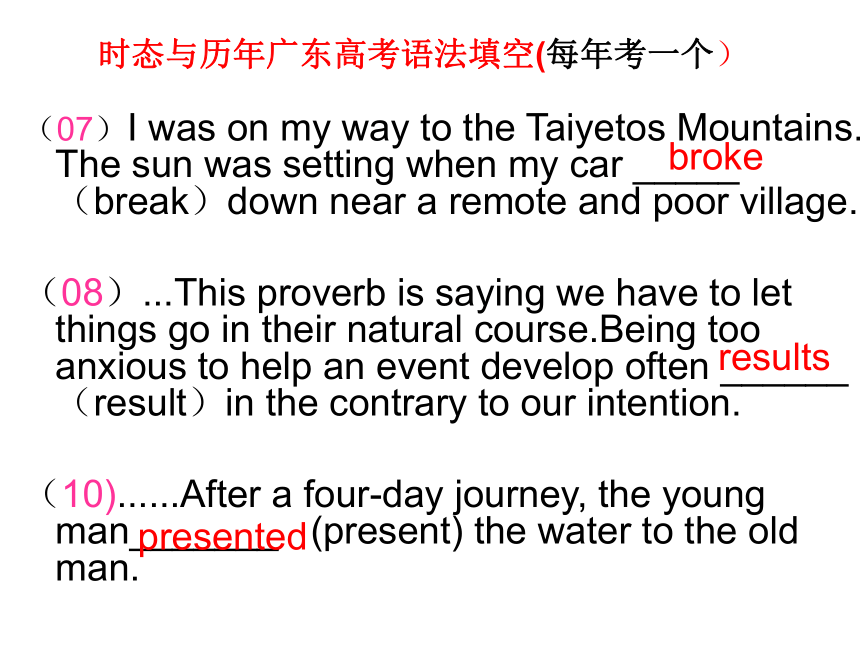
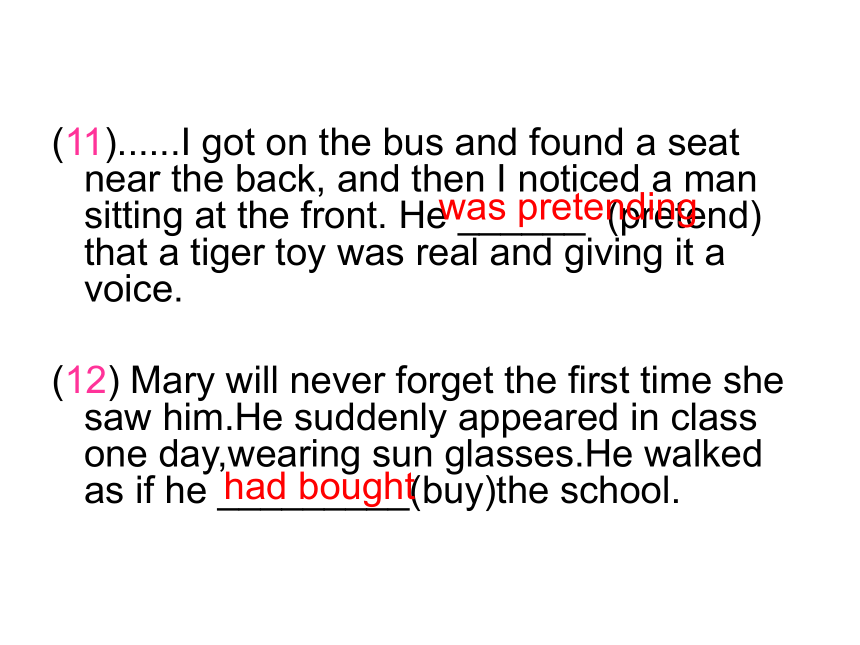

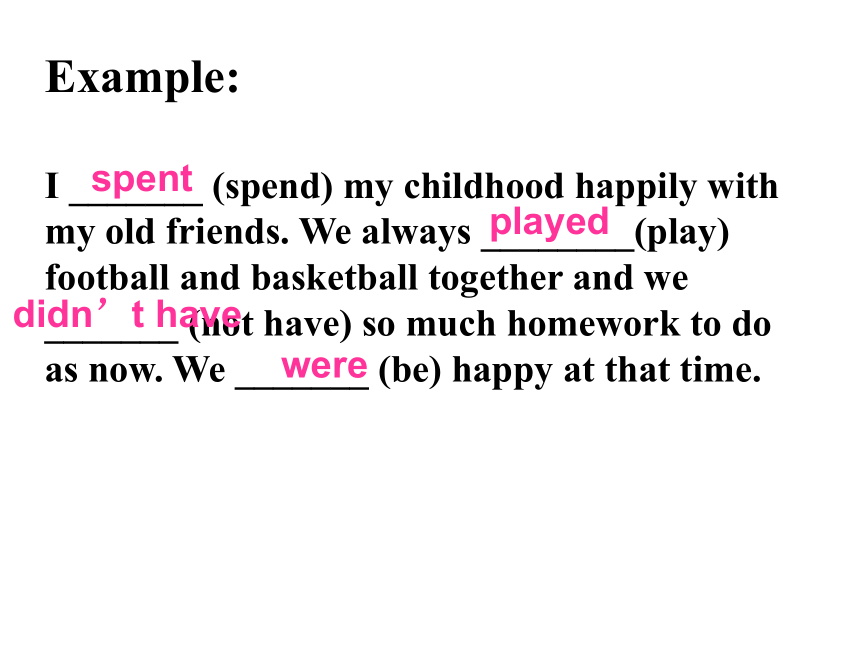

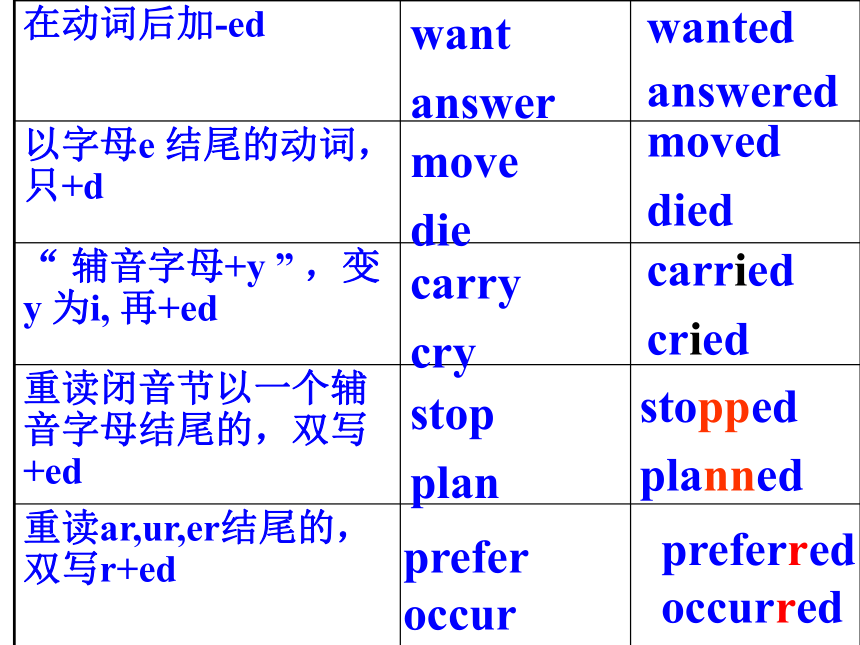
文档简介
课件71张PPT。Welcome To Our Classwelcome to our English classLet's enjoy an English song:
My love westlife an empty street an empty house a hole inside my heart I'm all alone and the roomsare getting smaller I wonder how I wonder why I wonder where they are
the days we had the songs we sang together and oh! my love I'm holding on forever Reaching for a love that seems so far so I say a litter prayer no my dream will take me there where the skies are blue to see you once again my love
English Basic
Tenses (时态)时态名称一般现在时
一般过去时
现在进行时
过去进行时
现在完成时
过去完成时
一般将来时
过去将来时
现在完成进行时
将来完成时结构(以play 为例)标志语
一般过去时 ( played )
一般现在时 ( play/plays)
一般将来时 ( will/is/are/am going to play )
现在进行时 (are/is/am playing)
过去进行时 (was /were playing)
现在完成时 (have/has played)
过去完成时? (had played)
过去将来时 (would/was/were going to play)
现在完成进行时(have/has been playing)将来完成时 (will have done)名称结构标志语时态与历年广东高考语法填空(每年考一个)(07)I was on my way to the Taiyetos Mountains. The sun was setting when my car _____ (break)down near a remote and poor village.
(08)...This proverb is saying we have to let things go in their natural course.Being too anxious to help an event develop often ______ (result)in the contrary to our intention.
(10)......After a four-day journey, the young man_______ (present) the water to the old man.
brokeresultspresented(11)......I got on the bus and found a seat near the back, and then I noticed a man sitting at the front. He ______ (pretend) that a tiger toy was real and giving it a voice.
(12) Mary will never forget the first time she saw him.He suddenly appeared in class one day,wearing sun glasses.He walked as if he _________(buy)the school.
was pretendinghad boughtHow did you spend your childhood?
(3 sentences or more,使用实意动词和系动词, 注意动词形式变化)Example:
I _______ (spend) my childhood happily with my old friends. We always ________(play) football and basketball together and we _______ (not have) so much homework to do as now. We _______ (be) happy at that time.
spentplayed didn’t havewere一般过去时:
概念:
结构:
标志语:表示过去发生的动作didyesterday、... ago、after…
in 1992、 last week/month...moved
diedcarried
criedstopped
plannedansweredprefer
occur
preferred
occurredwantedHow is your daily life as a high school student?(3 sentences or more,使用实意动词和系动词,
注意动词形式变化)一般现在时:
概念:
结构:
标志语:表示习惯、经常性的动作do、 doesusually、often、never、 sometimes、once a week、
twice a month、every year....主语是第三人称单数,谓语动词的变化规律如下:1 、 一般情况下+s。
2 、 以辅音字母加y结尾 的单词把y变i+es,
3、 以s,x,ch,sh,o结尾 的单词+es。 Tom , who _____(go) to school every day, ______(study) very hard and never ________(watch) TV in the evening.Besides, he seldom _______(play) computer at home. And he always _______(wash) his clothes and ____(fix) his bike by himself. He often_______ (express) his hope of going to college.goesstudieswatchesplayswashesfixesexpresses2. 其他用法:
He said that the earth ________(move) around the sun.
2)表示不受时间限制的科学事实或客观真理。moves4) 主句是一般将来时,时间、条件、让步状语从句的谓语动词用一般现在时表示将来。1.I will go there after I_____(finish) my work.
2.Unless it______( rain) tomorrow, I will go there.
3. No matter what _______(happen),I will
suport you.
4. I don't know if he _______(come) tomorrow. rainsfinishhappenswill comeDescribeWhat a fine day today! Look.... ExerciseThe twins ___________(wash) the clothes now.
Look! He ________ (play) basketball over there.
Listen! ______ Sally _______(sing)?are washingis playing现在进行时: 概念:
结构:
标志语: 表示现在正在发生的动作be (is, am, are) + doingLook! 、 Listen! 、now
at this time/moment...
动词-ing形式的构成:writing
takinggetting
running
swimmingaskinggoing2. 其他用法
1) 表示逐渐变化,多数是表示转变的系动词如turn,become,get, go, grow.
It 's spring now,and it ______(get)warmer and warmer.
2) 表示现阶段正在进行的动作,但说话时动作未必正在进行。
She is learning piano under Mr. Smith.
I’ m leaving tomorrow.
The old man is dying soon because of serious illness.is getting3) 现在进行时用来表示即将发生的动作,多用于表示移动的短暂性动词,如: come, go, start, arrive, leave, die.
On August 8, 2008, the 29th Olympic Games were opening in Beijing.What were you doing on that day? 过去进行时
1. 结构:
2. 概念:
标志语:was/ were + doing
表示过去某时或某段时间正在进行的动作或状态。
at ten yesterday, from nine to ten last evening, when…, while… then
at that time/moment ...
1.He ___________ (prepare) his lecture all day yesterday.
2.They ___________(work) when I left.
3.He said she ___________(arrive )the next day.was preparingwere workingwas arrivingExercises
I usually ____ up at 6:00, but yesterday I ______ up at 7:00 and tomorrow I _________ up at 6:30. (get)
2 How often _____ Andy _______ (surf) the internet?
3 He fell asleep while he ___________ (read) a book.
4 I didn't see him last Sunday,because she ________ (enjoy) herself in New York then.
group competitiongetwill getgot doessurfwas readingwas enjoying5. My brother often _________ (go) for walks last summer.
6. ______ the story ________ (happen) in London in 1949?
7. What ______ his mother ______ (do) when he opened the door?
8.The old woman __________(walk)across the street when suddenly she was hit by a car.
.
wentDid happenwasdoingwas walkingOne good turn deserves another
I _____________ (have) dinner at a restaurant when Tony Steele came in. Tony _______ (work) in a lawyer's office years ago, but he ____________ (work) at a bank now. He ______ (get) a good salary, but he always _______ (borrow) money from his friends and never ______ (pay) it back. Tony _____ (see) me and _____ (come) and ____ (sit) at the same table. He ___ never ____________ (borrow) money from me. While he ______________ (eat), I _____ (ask) him to lend me twenty pounds. To my surprise, he _____ (give) me the money immediately. 'I have never borrowed any money from you,' Tony said, 'so now you can pay for my dinner!' was havingworkedis workingaskedsawcamehassatgavewas eatingborrowsgetspaysborrowed犹如pictureHow will you spend your summer vocation next year?
I will…
I’m going to…
一般将来时:
概念: 表示将要发生的动作
结构: will do、 shall do、
be (is、am、are) going to do
标志语:tomorrow、in..、next…
will / are (is,am) going to do
2. are/is/am +to do,按计划或正式安排将发生的事。
We are to have an exam this week.3. are/is/am about to do, 表示马上做某事, 不能与明确表示将来的时间状语连用. He is about to leave for Beijing.Dad said to me, “I will buy a computer for you if you can pass the exam.”
Dad told me (that) he _________ (buy) a computer for me if I could pass the exam.
would buy过去将来时:
概念: 表示过去将要发生的动作
结构: would/should do
be (was、were) going to do
标志语:常用于主句是一般过去
时的宾语从句中He said,He told us that.
The boy promised he would work hard.
I told my parents I should return early.2).其他形式.
was (were) to do +动词原形
was (were) about to
was/were going to do六. 现在完成时(The present Perfect Tense) 1. 结构: have (has) +过去分词
2.用法:
1). 现在完成时表示过去某一时间开始,一直延
续到现在的动作或状态, 通常用于延续性动词. 常与表示延续性的时间状语连用,如:so far, up to now, recently, in the past 6 years, since…,
for … 等等. I have lived in Zhuhai for 3 years.2).表示发生在过去的某一动作对现在造成的影响
或结果,常用的时间状语有: just ,already, yet,
ever, never, once等等.
We have finished our lunch already.
Have you ever tried this method?比较一般过去时与现在完成时 1). 一般过去时只表示发生在过去的动作或存在的状态, 不涉及对现在的影响;现在完成时表示发生在过去的动作或状态一直延续到现在,或强调过去的事情对现在的造成的影响。
My family lived in Zhuhai ten years ago.
(现在不在了)
My family have lived in Zhuhai for 10 years.
(目前还在珠海)
2). 过去时常与具体的表示过去的时间状语连用,而现在完成时通常与不确定的或包括现在在内的时间状语连用,或无时间状语.
I studied in Zhongshan university in 2000.
(2000年表示具体的过去时间)
I have studied in Zhongshan university since 2000. (since 2000表示从2000年至今,包括现在在内)
I have just bought an apartment. (just表示不确定的时间状语)七.过去完成时?(The past perfect Tense)结构: had + 过去分词
概念:表示过去的过去 ----|--------------|---------|---->
过去之前 过去 现在 将来
You graduated (毕业) from Junior Middle School in July 2009. You had stayed there for 3 years when you graduated.
When the police arrived, the thieves _________________(run away).
When I came into the classroom, my dear students ______________ (begin) reading. had run awayhad begunExercises
I usually ____ up at 6:00, but yesterday I ______ up at 7:00 and tomorrow I _________ up at 6:30. (get)
Listen! Someone ____________ (knock) at the door.
I ___________ (be) in Beijing for two years.
How often _____ Andy _______ (surf) the internet?
He fell asleep while he ___________ (read) a book.
group competitiongetwill getgotis knocking have been doessurfwas reading6. I ________ never _______ (hear) of that man before.
7. My brother often _________ (go) for walks last summer.
8. Lily said she _______ (put) on the new dress the next day.
9. ______ the story ________ (happen) in London in 1949?
10. What ______ his mother ______ (do) when he opened the door?
haveheardwentwould Did happenwasdoing11. If it ______________ (not rain) tomorrow, they ___________ (go) fishing.
12. ______ your mother ________ the piano every Sunday?
13. They _______ (not) call you the day after tomorrow.
14. Tom _____________ (work) there since two years ago.
15. By the time I _________ (walk) into the classroom, the teacher ___________ (start) teaching.
doesn’t rainwill go Does has workedwon’t walkedhad startedplay Jenny
Jenny _____ (be) a foreign girl. She _______ (come) from the United States. Look, she _____________ (draw) pictures in the living room.
Two years ago, her parents _________ (move) to China. Jenny ____________ (not have) any friends, so she _______ (feel) lonely. But now, she _______ (have) many Chinese friends and _______ (study) with them everyday. Jenny ___________ (visit) her grandparents in the United States next month.iscomesis drawingmoveddidn’t havefelthasstudieswill visit动词的语态 (voice) 动词的语态 语态有两种:主动语态和被动语态。 主语是动作的发出者为主动语态;
主语是动作的接受者为被动语态。 We watched a film last night.
I drink milk everyday.
A film _________________________.
Milk ___________________________.
Summary (总结): is / was +done (p.p)
Present/ past simple(一般现在/过去时) was watched by us last nightis drunk by me everydayWill/ would be done
新电脑下周将投入使用。
The new computers will be used next week.
妈妈告诉我我的自行车明天去修。
My mother told me that my bike would be repaired the next day.
Present/ past future(一般将来时/ 过去将来时) am/ is /are being done
was/ were being done
中国国家大剧院正在建设当中。
The National Opera Building is being built at present.
Present/ past progressive (现在进行时/过去进行时) has/ have been done
had been done
这个问题已经得到了圆满的解决。
The problem has been well solved.
昨天晚上我到超市的时候,牛奶已经卖完了。
The milk had been sold when I got to the supermarket last night. Present/ past perfect (现在完成时/ 过去完成时) 不及物动词或动词短语无被动语态
比较: rise是不及物动词;raise是及物动词。 The price has been risen. The price has risen.
The price has raised. The price has been raised.
The accident was happened last week. The accident happened last week. (错)(对)(错)(对)(错)(对) 要想正确地使用被动语态,就须注意哪些动词是及物的,哪些是不及物的。特别是一词多义的动词往往有两种用法。解决这一问题唯有在学习过程中多留意积累。一般现在时: be( am/are/is) + done( 过去分词)
一般过去时: be(was/ were) + done
一般将来时: will be + done
过去将来时: would be + done
现在进行时: be( am/are/is)+ being+ done
过去进行时:be(was/ were )+ being+ done
现在完成时: have/ has+ been + done
过去完成时:had + been + done
高中英语教学大纳中要求掌握的只有八种:一般现在时,一般过去时,一般将来时,现在进行时,过去进行时,现在完成时,过去完成时,过去将来时。 另外现在完成进行时,过去完成进行时和将来完成时也比较常用。动词时态和语态时态 主动 被动
一般现在时 do be( am/are/is) + done
一般过去时 did be(was/ were) + done
一般将来时 Will do will be + done
过去将来时 Would do would be + done
现在进行 be( am/are/is)+doing
be( am/are/is)+ being+ done
过去进行时 be(was/ were )+doing
be(was/ were )+ being+ done
现在完成时 have/ has+ been +doing
have/ has+ been + done
过去完成时 had + been +doing
had + been +doneChallenge yourself!!!!1、对於这个问题,关注很少。
Little attention was paid to this problem.
2、课堂上应该鼓励小组讨论。
Group discussion should be encouraged in class.
3、据报导,这里将修建一条新的马路。
It is reported that a new road will be built here.
4、必须采取措施来防止河流受到污染。
Measures should be taken to stop the river from being polluted.动词时态的一些典型用法1. 在条件状语从句、时间状语从句、让步状语从句中,主将从现。
The new secretary is supposed to report to the manager
as soon as she arrives.
— Can I join your club, Dad?
— You can when you get a bit older.
Hundreds of jobs will be lost if the factory closes.
He will work wherever he is wanted.2. 语境中的过去时,往往表示“刚才,刚刚”之意,暗示现在已“不再这样”。
① — Come on in, Peter. I want to show you something.
— Oh, how nice of you ! I never thought you were going to bring me a gift.
② Your phone number again? I didn’t quite catch it.
③ — Nancy is not coming tonight.
— But she promised !
3. 用一般过去时表示过去经常发生的动作 (也可用 “used to do”或 “would do” 代替)。
During the vacation I often swam/ would swim in the sea.
I used to smoke. 4. 表示愿望、打算一类的词,如:hope, expect, mean, intend, want, think, suppose等,其过去完成时表示过去未曾实现的愿望或意图。
I had hoped to see more of ShangHai.
I had meant to help you, but I was too busy at the moment.
I had thought you would come tomorrow.
5. 某些固定句式中的动词时态是固定的、约定俗成的。
① It / This is the first time I have come here.
It was the third time (that) he had made the same mistake.
② It is / has been two months since I gave up smoking.
It was ten years since we had had such a wonderful time.
③ I was about to go out when the telephone rang.
④ They were reading when Tom shouted in pain. ⑤ Hardly (No sooner) had I got home when (than) the rain poured down.
⑥ It + be + 一段时间 + before 从句
It won’t be long before he succeeds.
( = He will succeed soom.)
It was ten years before they met again.
( = They met again ten years later. )How is your daily life as a high school student?(3 sentences or more,使用实意动词和系动词,
注意动词形式变化)高考对于进行体的常考点 ① 一个长动作作为背景,被一个短动作打断,长动作往往用进行体,短动作用一般体。如:
My brother fell while he was riding his bicycle and hurt himself.
The students were writing busily when Miss Brown went to get a book she had left in the office.
Tom slipped into the house when no one was looking.
As she was reading the newspaper, Granny fell asleep.
The reporter said that the UFO was traveling east to west when he saw it. ② 表示动作的未完性、暂时性。如:
— Have you moved into the new house ?
— Not yet. The rooms are being painted.
I don’t really work here; I am just helping out until the new secretary arrives.
Shirley was writing a book about China last year but I don’t know whether she has finished it.
Selecting a mobile phone for a personal use is no easy task because technology is changing so rapidly. ③ 表示计划、安排要做的事。如:
I’ve won a holiday for two days to Florida. I am taking my mum.
— What were you doing when Tony phoned you ?
— I had just finished my work and was starting to take a shower. ④ 表示现在或当时发展中的或正在进行的情况。
I don’t think Jim saw me; he was just staring into space.
I first met Lisa 3 years ago. She was working at a radio shop at the time.
— Is this raincoat yours ?
— No, mine is hanging there behind the door.
— Hey, look where you are going !
— Oh, I’m terribly sorry, I wasn’t noticing. 主动和被动一、 get + 过去分词可以表示被动,此结构比较口语化。
She got married last week.
The patient got treated once a week.
He fell off the car and got killed.
be seated / be hidden
He is seated on a bench.
(He seats himself on a bench.)
He was hidden behind the door.
(He hid himself behind the door.)
be lost / be drunk / be dressed (in)二、 主动形式表被动意义
1. 系动词look, sound, feel, smell, taste, appear, seem, go, prove, turn, stay, become, fall, get, grow, keep + 形容词/名词, 构成系表结构。
The steel feels cold.
His plan proved (to be) practical.
It has gone bad. 2. 表示开始、结束、运动的动词。如:begin, finish, start, open, close, stop, end, shut, run, move 等。
Work began at 7 o’clock this morning.
The shop closes at 6 p.m. every day.
3. need / want / require doing, be worth doing, be to blame主动表被动。
4. 在“be + 形容词 + to do”中,不定式的逻辑宾语是句子的主语,用主动代被动。
This kind of water isn’t fit to drink.
The girl isn’t easy to get along with. 5. 表示主语的某种属性特征的动词。如read, write, act, iron, cut, draw, drive, sell, wash, clean, wear, open, cook, lock, shut, dry, eat, drink。这类动词一般不单独使用,常用一个修饰语。
This coat dries easily.
Nylon cleans easily.
The door won’t lock.
Food can keep fresh in a fridge.
Your speech reads well.
This material has worn thin.
His book does not sell. (没有销路)
Your pen writes smoothly.
The plan worked out wonderfully.
The recorder won’t play.
This knife cuts well.
The cloth washes well. (耐洗)
Tenses (时态)时态名称一般现在时
一般过去时
现在进行时
过去进行时
现在完成时
过去完成时
一般将来时
过去将来时
现在完成进行时
将来完成时结构(以play 为例)标志语
一般过去时 ( played )
一般现在时 ( play/plays)
一般将来时 ( will/is/are/am going to play )
现在进行时 (are/is/am playing)
过去进行时 (was /were playing)
现在完成时 (have/has played)
过去完成时? (had played)
过去将来时 (would/was/were going to play)
现在完成进行时(have/has been playing)将来完成时 (will have done)名称结构标志语时态与历年广东高考语法填空(每年考一个)(07)I was on my way to the Taiyetos Mountains. The sun was setting when my car _____ (break)down near a remote and poor village.
(08)...This proverb is saying we have to let things go in their natural course.Being too anxious to help an event develop often ______ (result)in the contrary to our intention.
(10)......After a four-day journey, the young man_______ (present) the water to the old man.
brokeresultspresented(11)......I got on the bus and found a seat near the back, and then I noticed a man sitting at the front. He ______ (pretend) that a tiger toy was real and giving it a voice.
(12) Mary will never forget the first time she saw him.He suddenly appeared in class one day,wearing sun glasses.He walked as if he _________(buy)the school.
was pretendinghad boughtHow did you spend your childhood?
(3 sentences or more,使用实意动词和系动词, 注意动词形式变化)Example:
I _______ (spend) my childhood happily with my old friends. We always ________(play) football and basketball together and we _______ (not have) so much homework to do as now. We _______ (be) happy at that time.
spentplayed didn’t havewere一般过去时:
概念:
结构:
标志语:表示过去发生的动作didyesterday、... ago、after…
in 1992、 last week/month...moved
diedcarried
criedstopped
plannedansweredprefer
occur
preferred
occurredwantedHow is your daily life as a high school student?(3 sentences or more,使用实意动词和系动词,
注意动词形式变化)一般现在时:
概念:
结构:
标志语:表示习惯、经常性的动作do、 doesusually、often、never、 sometimes、once a week、
twice a month、every year....主语是第三人称单数,谓语动词的变化规律如下:1 、 一般情况下+s。
2 、 以辅音字母加y结尾 的单词把y变i+es,
3、 以s,x,ch,sh,o结尾 的单词+es。 Tom , who _____(go) to school every day, ______(study) very hard and never ________(watch) TV in the evening.Besides, he seldom _______(play) computer at home. And he always _______(wash) his clothes and ____(fix) his bike by himself. He often_______ (express) his hope of going to college.goesstudieswatchesplayswashesfixesexpresses2. 其他用法:
He said that the earth ________(move) around the sun.
2)表示不受时间限制的科学事实或客观真理。moves4) 主句是一般将来时,时间、条件、让步状语从句的谓语动词用一般现在时表示将来。1.I will go there after I_____(finish) my work.
2.Unless it______( rain) tomorrow, I will go there.
3. No matter what _______(happen),I will
suport you.
4. I don't know if he _______(come) tomorrow. rainsfinishhappenswill comeDescribeWhat a fine day today! Look.... ExerciseThe twins ___________(wash) the clothes now.
Look! He ________ (play) basketball over there.
Listen! ______ Sally _______(sing)?are washingis playing现在进行时: 概念:
结构:
标志语: 表示现在正在发生的动作be (is, am, are) + doingLook! 、 Listen! 、now
at this time/moment...
动词-ing形式的构成:writing
takinggetting
running
swimmingaskinggoing2. 其他用法
1) 表示逐渐变化,多数是表示转变的系动词如turn,become,get, go, grow.
It 's spring now,and it ______(get)warmer and warmer.
2) 表示现阶段正在进行的动作,但说话时动作未必正在进行。
She is learning piano under Mr. Smith.
I’ m leaving tomorrow.
The old man is dying soon because of serious illness.is getting3) 现在进行时用来表示即将发生的动作,多用于表示移动的短暂性动词,如: come, go, start, arrive, leave, die.
On August 8, 2008, the 29th Olympic Games were opening in Beijing.What were you doing on that day? 过去进行时
1. 结构:
2. 概念:
标志语:was/ were + doing
表示过去某时或某段时间正在进行的动作或状态。
at ten yesterday, from nine to ten last evening, when…, while… then
at that time/moment ...
1.He ___________ (prepare) his lecture all day yesterday.
2.They ___________(work) when I left.
3.He said she ___________(arrive )the next day.was preparingwere workingwas arrivingExercises
I usually ____ up at 6:00, but yesterday I ______ up at 7:00 and tomorrow I _________ up at 6:30. (get)
2 How often _____ Andy _______ (surf) the internet?
3 He fell asleep while he ___________ (read) a book.
4 I didn't see him last Sunday,because she ________ (enjoy) herself in New York then.
group competitiongetwill getgot doessurfwas readingwas enjoying5. My brother often _________ (go) for walks last summer.
6. ______ the story ________ (happen) in London in 1949?
7. What ______ his mother ______ (do) when he opened the door?
8.The old woman __________(walk)across the street when suddenly she was hit by a car.
.
wentDid happenwasdoingwas walkingOne good turn deserves another
I _____________ (have) dinner at a restaurant when Tony Steele came in. Tony _______ (work) in a lawyer's office years ago, but he ____________ (work) at a bank now. He ______ (get) a good salary, but he always _______ (borrow) money from his friends and never ______ (pay) it back. Tony _____ (see) me and _____ (come) and ____ (sit) at the same table. He ___ never ____________ (borrow) money from me. While he ______________ (eat), I _____ (ask) him to lend me twenty pounds. To my surprise, he _____ (give) me the money immediately. 'I have never borrowed any money from you,' Tony said, 'so now you can pay for my dinner!' was havingworkedis workingaskedsawcamehassatgavewas eatingborrowsgetspaysborrowed犹如pictureHow will you spend your summer vocation next year?
I will…
I’m going to…
一般将来时:
概念: 表示将要发生的动作
结构: will do、 shall do、
be (is、am、are) going to do
标志语:tomorrow、in..、next…
will / are (is,am) going to do
2. are/is/am +to do,按计划或正式安排将发生的事。
We are to have an exam this week.3. are/is/am about to do, 表示马上做某事, 不能与明确表示将来的时间状语连用. He is about to leave for Beijing.Dad said to me, “I will buy a computer for you if you can pass the exam.”
Dad told me (that) he _________ (buy) a computer for me if I could pass the exam.
would buy过去将来时:
概念: 表示过去将要发生的动作
结构: would/should do
be (was、were) going to do
标志语:常用于主句是一般过去
时的宾语从句中He said,He told us that.
The boy promised he would work hard.
I told my parents I should return early.2).其他形式.
was (were) to do +动词原形
was (were) about to
was/were going to do六. 现在完成时(The present Perfect Tense) 1. 结构: have (has) +过去分词
2.用法:
1). 现在完成时表示过去某一时间开始,一直延
续到现在的动作或状态, 通常用于延续性动词. 常与表示延续性的时间状语连用,如:so far, up to now, recently, in the past 6 years, since…,
for … 等等. I have lived in Zhuhai for 3 years.2).表示发生在过去的某一动作对现在造成的影响
或结果,常用的时间状语有: just ,already, yet,
ever, never, once等等.
We have finished our lunch already.
Have you ever tried this method?比较一般过去时与现在完成时 1). 一般过去时只表示发生在过去的动作或存在的状态, 不涉及对现在的影响;现在完成时表示发生在过去的动作或状态一直延续到现在,或强调过去的事情对现在的造成的影响。
My family lived in Zhuhai ten years ago.
(现在不在了)
My family have lived in Zhuhai for 10 years.
(目前还在珠海)
2). 过去时常与具体的表示过去的时间状语连用,而现在完成时通常与不确定的或包括现在在内的时间状语连用,或无时间状语.
I studied in Zhongshan university in 2000.
(2000年表示具体的过去时间)
I have studied in Zhongshan university since 2000. (since 2000表示从2000年至今,包括现在在内)
I have just bought an apartment. (just表示不确定的时间状语)七.过去完成时?(The past perfect Tense)结构: had + 过去分词
概念:表示过去的过去 ----|--------------|---------|---->
过去之前 过去 现在 将来
You graduated (毕业) from Junior Middle School in July 2009. You had stayed there for 3 years when you graduated.
When the police arrived, the thieves _________________(run away).
When I came into the classroom, my dear students ______________ (begin) reading. had run awayhad begunExercises
I usually ____ up at 6:00, but yesterday I ______ up at 7:00 and tomorrow I _________ up at 6:30. (get)
Listen! Someone ____________ (knock) at the door.
I ___________ (be) in Beijing for two years.
How often _____ Andy _______ (surf) the internet?
He fell asleep while he ___________ (read) a book.
group competitiongetwill getgotis knocking have been doessurfwas reading6. I ________ never _______ (hear) of that man before.
7. My brother often _________ (go) for walks last summer.
8. Lily said she _______ (put) on the new dress the next day.
9. ______ the story ________ (happen) in London in 1949?
10. What ______ his mother ______ (do) when he opened the door?
haveheardwentwould Did happenwasdoing11. If it ______________ (not rain) tomorrow, they ___________ (go) fishing.
12. ______ your mother ________ the piano every Sunday?
13. They _______ (not) call you the day after tomorrow.
14. Tom _____________ (work) there since two years ago.
15. By the time I _________ (walk) into the classroom, the teacher ___________ (start) teaching.
doesn’t rainwill go Does has workedwon’t walkedhad startedplay Jenny
Jenny _____ (be) a foreign girl. She _______ (come) from the United States. Look, she _____________ (draw) pictures in the living room.
Two years ago, her parents _________ (move) to China. Jenny ____________ (not have) any friends, so she _______ (feel) lonely. But now, she _______ (have) many Chinese friends and _______ (study) with them everyday. Jenny ___________ (visit) her grandparents in the United States next month.iscomesis drawingmoveddidn’t havefelthasstudieswill visit动词的语态 (voice) 动词的语态 语态有两种:主动语态和被动语态。 主语是动作的发出者为主动语态;
主语是动作的接受者为被动语态。 We watched a film last night.
I drink milk everyday.
A film _________________________.
Milk ___________________________.
Summary (总结): is / was +done (p.p)
Present/ past simple(一般现在/过去时) was watched by us last nightis drunk by me everydayWill/ would be done
新电脑下周将投入使用。
The new computers will be used next week.
妈妈告诉我我的自行车明天去修。
My mother told me that my bike would be repaired the next day.
Present/ past future(一般将来时/ 过去将来时) am/ is /are being done
was/ were being done
中国国家大剧院正在建设当中。
The National Opera Building is being built at present.
Present/ past progressive (现在进行时/过去进行时) has/ have been done
had been done
这个问题已经得到了圆满的解决。
The problem has been well solved.
昨天晚上我到超市的时候,牛奶已经卖完了。
The milk had been sold when I got to the supermarket last night. Present/ past perfect (现在完成时/ 过去完成时) 不及物动词或动词短语无被动语态
比较: rise是不及物动词;raise是及物动词。 The price has been risen. The price has risen.
The price has raised. The price has been raised.
The accident was happened last week. The accident happened last week. (错)(对)(错)(对)(错)(对) 要想正确地使用被动语态,就须注意哪些动词是及物的,哪些是不及物的。特别是一词多义的动词往往有两种用法。解决这一问题唯有在学习过程中多留意积累。一般现在时: be( am/are/is) + done( 过去分词)
一般过去时: be(was/ were) + done
一般将来时: will be + done
过去将来时: would be + done
现在进行时: be( am/are/is)+ being+ done
过去进行时:be(was/ were )+ being+ done
现在完成时: have/ has+ been + done
过去完成时:had + been + done
高中英语教学大纳中要求掌握的只有八种:一般现在时,一般过去时,一般将来时,现在进行时,过去进行时,现在完成时,过去完成时,过去将来时。 另外现在完成进行时,过去完成进行时和将来完成时也比较常用。动词时态和语态时态 主动 被动
一般现在时 do be( am/are/is) + done
一般过去时 did be(was/ were) + done
一般将来时 Will do will be + done
过去将来时 Would do would be + done
现在进行 be( am/are/is)+doing
be( am/are/is)+ being+ done
过去进行时 be(was/ were )+doing
be(was/ were )+ being+ done
现在完成时 have/ has+ been +doing
have/ has+ been + done
过去完成时 had + been +doing
had + been +doneChallenge yourself!!!!1、对於这个问题,关注很少。
Little attention was paid to this problem.
2、课堂上应该鼓励小组讨论。
Group discussion should be encouraged in class.
3、据报导,这里将修建一条新的马路。
It is reported that a new road will be built here.
4、必须采取措施来防止河流受到污染。
Measures should be taken to stop the river from being polluted.动词时态的一些典型用法1. 在条件状语从句、时间状语从句、让步状语从句中,主将从现。
The new secretary is supposed to report to the manager
as soon as she arrives.
— Can I join your club, Dad?
— You can when you get a bit older.
Hundreds of jobs will be lost if the factory closes.
He will work wherever he is wanted.2. 语境中的过去时,往往表示“刚才,刚刚”之意,暗示现在已“不再这样”。
① — Come on in, Peter. I want to show you something.
— Oh, how nice of you ! I never thought you were going to bring me a gift.
② Your phone number again? I didn’t quite catch it.
③ — Nancy is not coming tonight.
— But she promised !
3. 用一般过去时表示过去经常发生的动作 (也可用 “used to do”或 “would do” 代替)。
During the vacation I often swam/ would swim in the sea.
I used to smoke. 4. 表示愿望、打算一类的词,如:hope, expect, mean, intend, want, think, suppose等,其过去完成时表示过去未曾实现的愿望或意图。
I had hoped to see more of ShangHai.
I had meant to help you, but I was too busy at the moment.
I had thought you would come tomorrow.
5. 某些固定句式中的动词时态是固定的、约定俗成的。
① It / This is the first time I have come here.
It was the third time (that) he had made the same mistake.
② It is / has been two months since I gave up smoking.
It was ten years since we had had such a wonderful time.
③ I was about to go out when the telephone rang.
④ They were reading when Tom shouted in pain. ⑤ Hardly (No sooner) had I got home when (than) the rain poured down.
⑥ It + be + 一段时间 + before 从句
It won’t be long before he succeeds.
( = He will succeed soom.)
It was ten years before they met again.
( = They met again ten years later. )How is your daily life as a high school student?(3 sentences or more,使用实意动词和系动词,
注意动词形式变化)高考对于进行体的常考点 ① 一个长动作作为背景,被一个短动作打断,长动作往往用进行体,短动作用一般体。如:
My brother fell while he was riding his bicycle and hurt himself.
The students were writing busily when Miss Brown went to get a book she had left in the office.
Tom slipped into the house when no one was looking.
As she was reading the newspaper, Granny fell asleep.
The reporter said that the UFO was traveling east to west when he saw it. ② 表示动作的未完性、暂时性。如:
— Have you moved into the new house ?
— Not yet. The rooms are being painted.
I don’t really work here; I am just helping out until the new secretary arrives.
Shirley was writing a book about China last year but I don’t know whether she has finished it.
Selecting a mobile phone for a personal use is no easy task because technology is changing so rapidly. ③ 表示计划、安排要做的事。如:
I’ve won a holiday for two days to Florida. I am taking my mum.
— What were you doing when Tony phoned you ?
— I had just finished my work and was starting to take a shower. ④ 表示现在或当时发展中的或正在进行的情况。
I don’t think Jim saw me; he was just staring into space.
I first met Lisa 3 years ago. She was working at a radio shop at the time.
— Is this raincoat yours ?
— No, mine is hanging there behind the door.
— Hey, look where you are going !
— Oh, I’m terribly sorry, I wasn’t noticing. 主动和被动一、 get + 过去分词可以表示被动,此结构比较口语化。
She got married last week.
The patient got treated once a week.
He fell off the car and got killed.
be seated / be hidden
He is seated on a bench.
(He seats himself on a bench.)
He was hidden behind the door.
(He hid himself behind the door.)
be lost / be drunk / be dressed (in)二、 主动形式表被动意义
1. 系动词look, sound, feel, smell, taste, appear, seem, go, prove, turn, stay, become, fall, get, grow, keep + 形容词/名词, 构成系表结构。
The steel feels cold.
His plan proved (to be) practical.
It has gone bad. 2. 表示开始、结束、运动的动词。如:begin, finish, start, open, close, stop, end, shut, run, move 等。
Work began at 7 o’clock this morning.
The shop closes at 6 p.m. every day.
3. need / want / require doing, be worth doing, be to blame主动表被动。
4. 在“be + 形容词 + to do”中,不定式的逻辑宾语是句子的主语,用主动代被动。
This kind of water isn’t fit to drink.
The girl isn’t easy to get along with. 5. 表示主语的某种属性特征的动词。如read, write, act, iron, cut, draw, drive, sell, wash, clean, wear, open, cook, lock, shut, dry, eat, drink。这类动词一般不单独使用,常用一个修饰语。
This coat dries easily.
Nylon cleans easily.
The door won’t lock.
Food can keep fresh in a fridge.
Your speech reads well.
This material has worn thin.
His book does not sell. (没有销路)
Your pen writes smoothly.
The plan worked out wonderfully.
The recorder won’t play.
This knife cuts well.
The cloth washes well. (耐洗)
